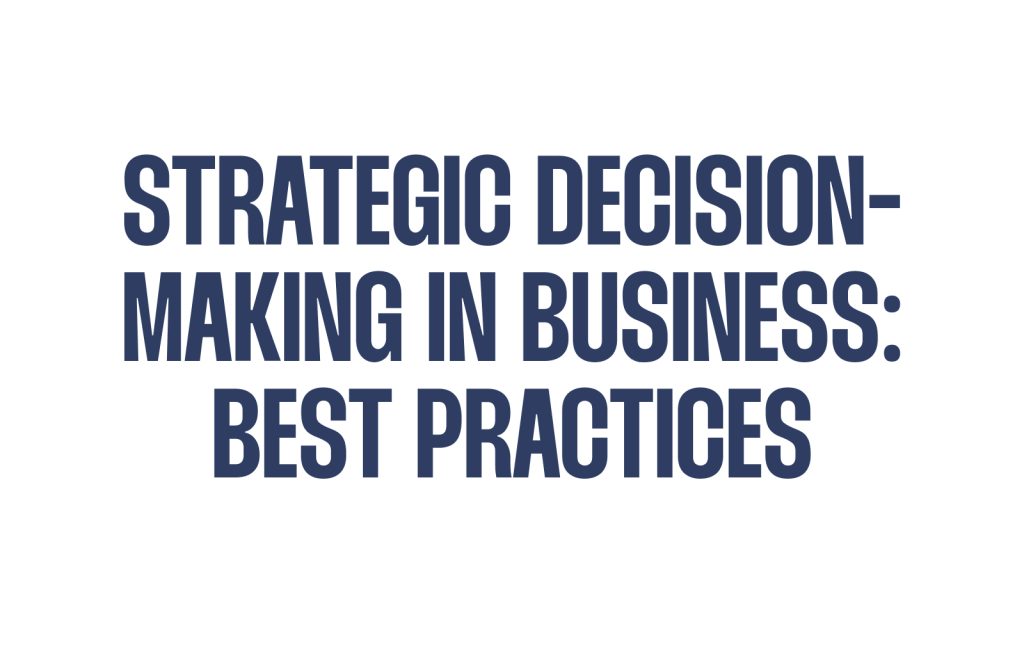Strategic Decision-Making in Business: Best Practices

Strategic decision-making is a critical aspect of running a successful business. It involves making choices that shape the organization’s direction, define its competitive advantage, and ultimately drive its success in the market. To make effective strategic decisions, business leaders need to follow best practices that ensure well-informed choices. Here are some essential strategies for strategic decision-making in business:
1. Data-Driven Approach
Data is a valuable asset when making strategic decisions. Analyzing relevant data, market trends, customer insights, and financial metrics provides a solid foundation for informed choices. Business leaders should invest in data analytics and reporting tools to gather accurate and up-to-date information for decision-making.
2. Set Clear Objectives
Before making strategic decisions, it’s crucial to set clear objectives and define the desired outcomes. Establishing specific, measurable, achievable, relevant, and time-bound (SMART) goals helps in aligning the decision-making process with the organization’s overall vision and mission.
3. Involve Key Stakeholders
Involving key stakeholders in the decision-making process is essential for gaining diverse perspectives and buy-in. Collaborating with executives, managers, and team members ensures that decisions consider different viewpoints and have a higher chance of successful implementation.
4. Assess Risks and Benefits
Strategic decisions often involve risk, and business leaders must carefully assess potential risks and benefits before finalizing their choices. Conducting risk assessments and cost-benefit analyses helps in understanding the potential impact of decisions on the organization.
5. Scenario Planning
Considering multiple scenarios before making a decision can help prepare for various outcomes. Scenario planning allows leaders to anticipate potential challenges and opportunities, making it easier to adapt and pivot when necessary.
6. Long-Term Vision
While addressing immediate needs is essential, strategic decisions should align with the long-term vision of the organization. Leaders should evaluate how each decision contributes to the company’s growth and sustainability over time.
7. Embrace Innovation
Innovation plays a crucial role in strategic decision-making. Leaders should be open to exploring new ideas and disruptive technologies that can give the business a competitive edge.
8. Evaluate Alternatives
Before finalizing a decision, leaders should evaluate multiple alternatives and carefully weigh their pros and cons. Considering different options helps in choosing the most viable and effective course of action.
9. Test and Iterate
In rapidly changing markets, it’s important to test strategic decisions on a smaller scale before full implementation. This approach allows for feedback, refinement, and adjustments based on real-world results.
10. Monitor and Evaluate
Strategic decision-making doesn’t end with implementation. Business leaders should continuously monitor the outcomes of their decisions and evaluate their effectiveness. This iterative process allows for continuous improvement and the ability to adapt to changing circumstances.
11. Emphasize Continuous Learning
Strategic decision-making is an ongoing process. Encourage a culture of continuous learning within the organization, where leaders and team members regularly seek knowledge and stay updated on industry trends.
Conclusion
Strategic decision-making is the cornerstone of business success. By following best practices that involve data-driven analysis, stakeholder involvement, risk assessment, and innovation, leaders can make informed choices that propel their organizations towards growth and prosperity. Strategic decision-making is not a one-time event; it’s a dynamic process that requires adaptability, creativity, and a long-term vision. By fostering a culture of strategic thinking, businesses can navigate challenges, seize opportunities, and stay ahead in a competitive market.
Business Hub for Notion
Your Business Hub, ENTIRELY in Notion. Tired of cobbling together multiple apps to form your Business? Me too. Business Hub lets you capture and organize everything inside of Notion – turning it into an all-in-one workspace.


















